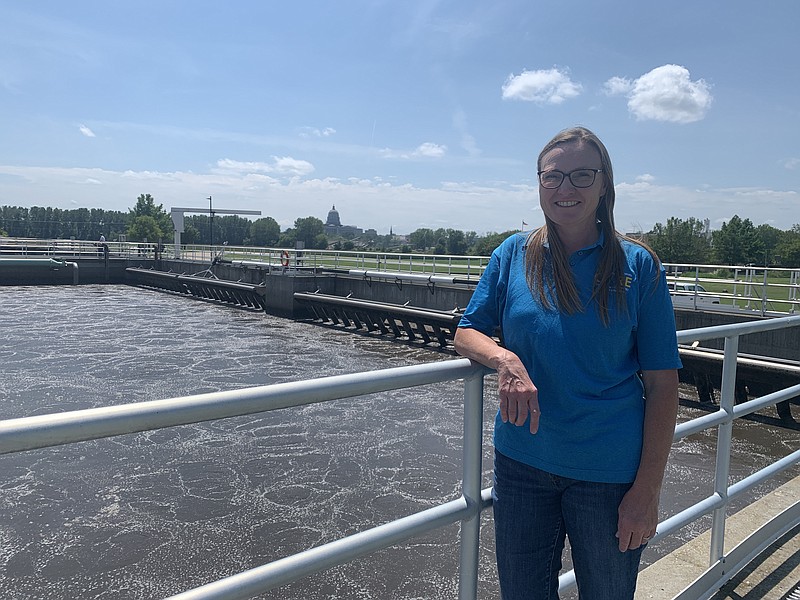It may not be the ideal job for everyone, but wastewater treatment plant manager Clara Haenchen takes pride in her "dirty job."
Haenchen oversees the Jefferson City Water Reclamation Facility, where wastewater from the city's residents collects and is treated before being put back into the Missouri River.
After growing up on a family farm in the area and studying at Lincoln University, Haenchen took a job in the laboratory at the facility in 1997.
"It was my first job out of college, and I've been here ever since," Haenchen said.
She had studied agriculture in school and always had an interest in water quality.
"I love Missouri's waterways, and I spend a lot of time on the Ozark Scenic Riverways, so water is a big deal to me," "There's a lot more to wastewater than a lot of people realize, so it was a big draw to me that there's a lot to learn."
During school, she worked for the lab at LU and did a summer of soil sampling research in Wyoming.
"When I was in college I worked in the lab a lot, and I did not want to work in the lab," Haenchen said. "I wanted to be out in the field. But when I graduated school, I applied to three lab jobs here in the city, and I got offered all three jobs. So I was like, 'OK, I guess I'm working in a lab.'"
Haenchen said she realized, as she got further into the field, how she could use her position to do outreach to other municipalities and educate other operators.
For many years, she has been involved in the Missouri Water Environment Association, which also provided her with a chance to be more involved in the field and gain management experience while serving as secretary for the organization.
"It's been really nice to be able to help others in the state," she said. "I'm very passionate about water quality, being that I grew up on the Missouri River. I'm very dedicated and hold myself and the staff here at high standards."
In 2016, Haenchen was promoted to interim plant manager, and later that year, she became the official plant manager.
As plant manager, Haenchen oversees most of what goes on at the facility - the laboratory where she started, pre-treatment of the water, operations of the plant, ensuring the facility meets all regulations, facility maintenance, and a variety of other important elements to ensure everything runs smoothly.
Haenchen also works with other employees to make sure everything is completed correctly and makes sure staff receive annual training required to renew wastewater operator licenses from the Missouri Department of Natural Resources.
The job has its challenges, like unexpected mechanical issues at the plant, increased rainfall and odor control, but she enjoys what she does.
For the first 18 years she worked at the facility, Haenchen was the only woman. For a few years, there were others.
"It's a male-dominated field, so to be a female in wastewater is also kind of challenging, yet rewarding at the same time," Haenchen said.
Haenchen said she would like to see more people understand and learn about the field and how important the work is.
"A lot of wastewater and sewer workers don't really get the accolades," she said. "They do one of the dirtiest, nastiest things out there, and they're front-line, critical employees."
Especially in recent months, during the COVID-19 pandemic, wastewater workers have been deemed essential. Wastewater treatment can't be halted.
Missouri's wastewater workers recently received recognition from Missouri Gov. Mike Parson. The governor declared Aug. 16-22 as Water and Wastewater Treatment Workers Week in the state, something Haenchen was happy to see.
Overall, Haenchen said she's proud to do her job and finds it very rewarding, even though it might be a bit dirty.
"It's a field that's very important," Haenchen said. "A lot of people just don't know a lot about it. What goes down the drain is never really thought of again, but I've always thought it was pretty interesting."

